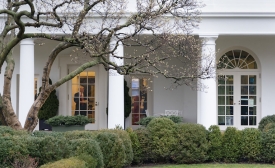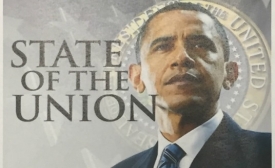state of the union

"America First" undermines the U.S.'s ability to form constructive global relationships, writes former British diplomat and Boston University Senior Lecturer Paul Hare.

It's a time-honored tradition: When a U.S. president gives his State of the Union address, interest groups pore over the carefully crafted remarks line by line, word by word, to assess the administration's priorities and blind spots. The exercise plays out, if to a lesser degree, overseas as well: The day after President Obama's sixth address, news outlets in Kiev, Beijing, and Tehran are picking apart references to their countries.
A State of the Union address is always a major public diplomacy moment. Rarely do you have the full attention of the entire world to tell every listener, watcher and tweeter, what exactly your current policy priorities are. For 2014, it is likely that President Obama will focus on domestic and international topics that are high up on America’s agenda and he is likely to stress that if Congress remains intransigent, he, the President, will have to use his Executive powers to make things happen in 2014 on the following issues.







